Unit 6 I'm watching TV. Section A(2a-2d)课件22张
文档属性
| 名称 | Unit 6 I'm watching TV. Section A(2a-2d)课件22张 | 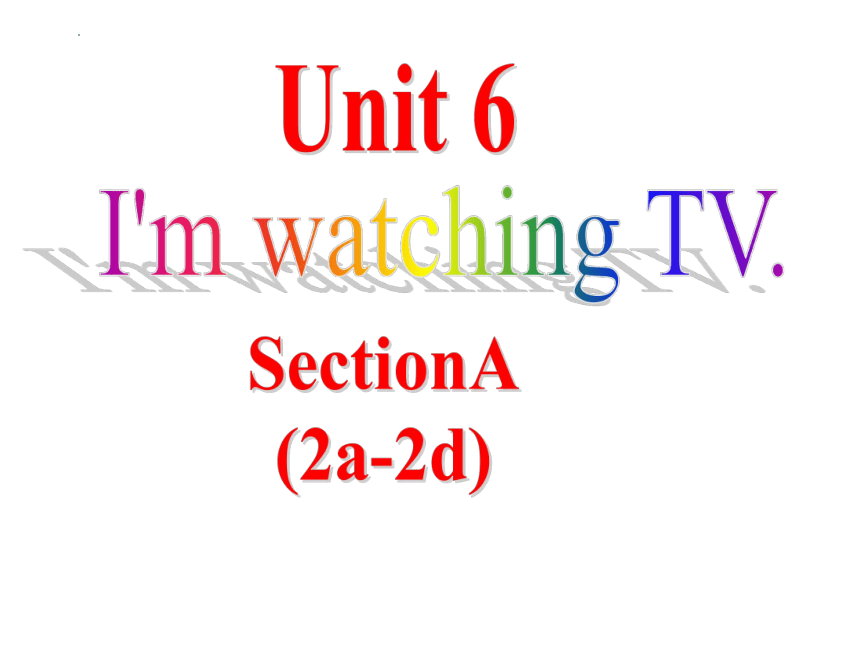 | |
| 格式 | pptx | ||
| 文件大小 | 402.6KB | ||
| 资源类型 | 教案 | ||
| 版本资源 | 人教新目标(Go for it)版 | ||
| 科目 | 英语 | ||
| 更新时间 | 2022-04-12 09:04:54 | ||
图片预览

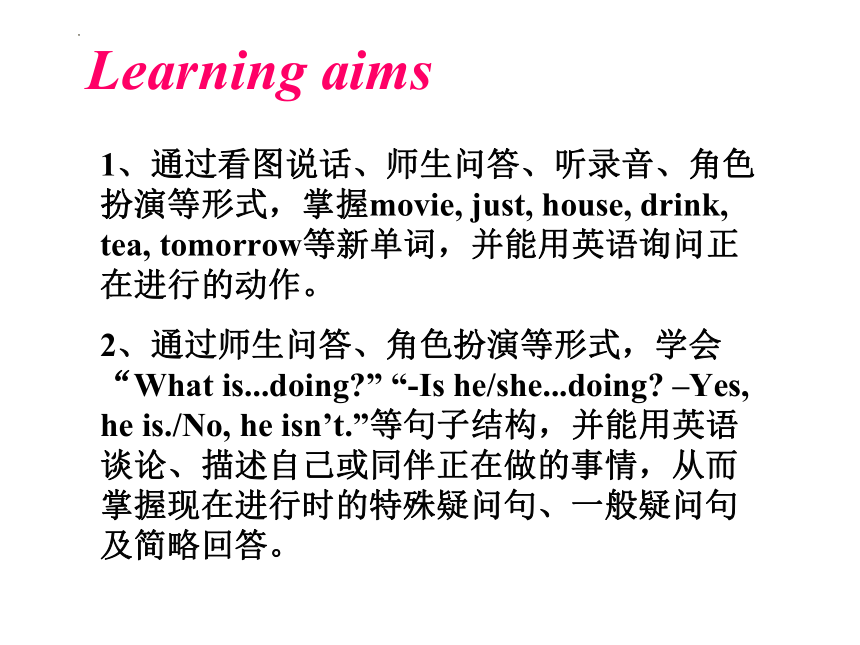
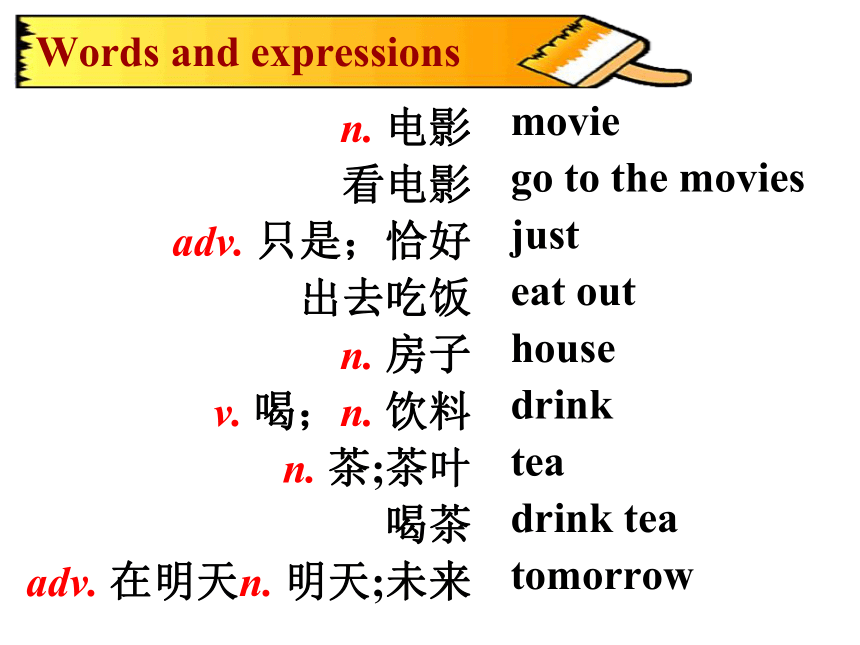
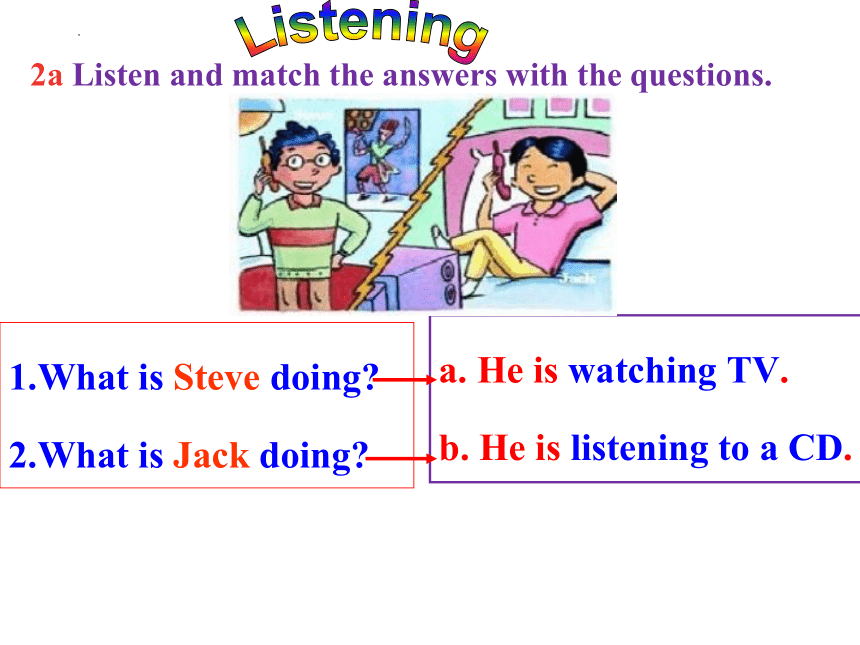
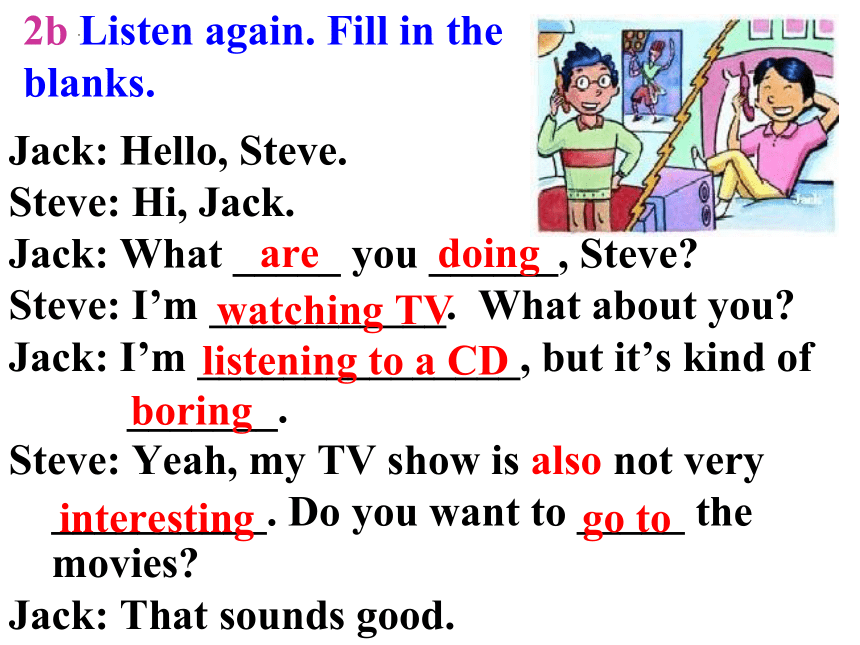
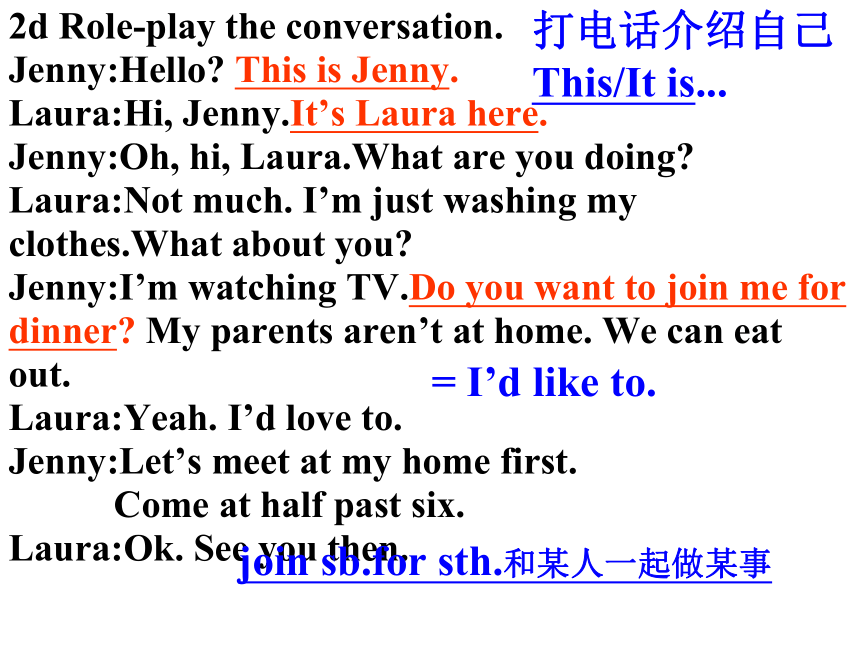
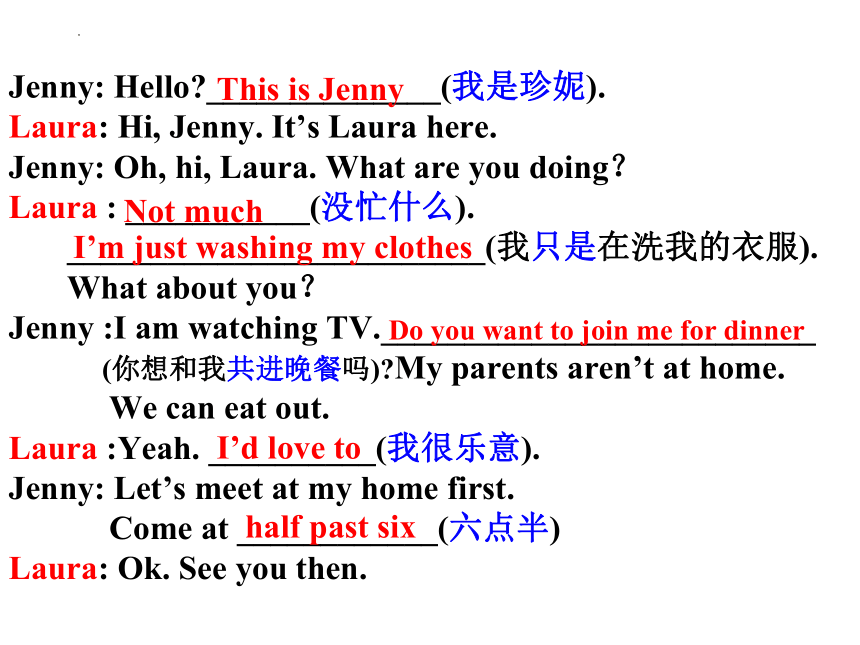
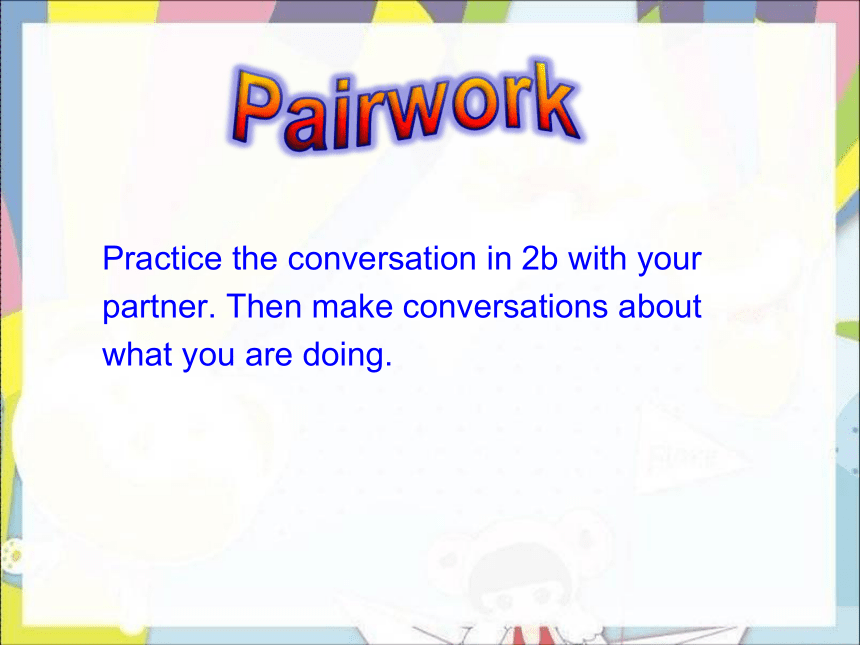
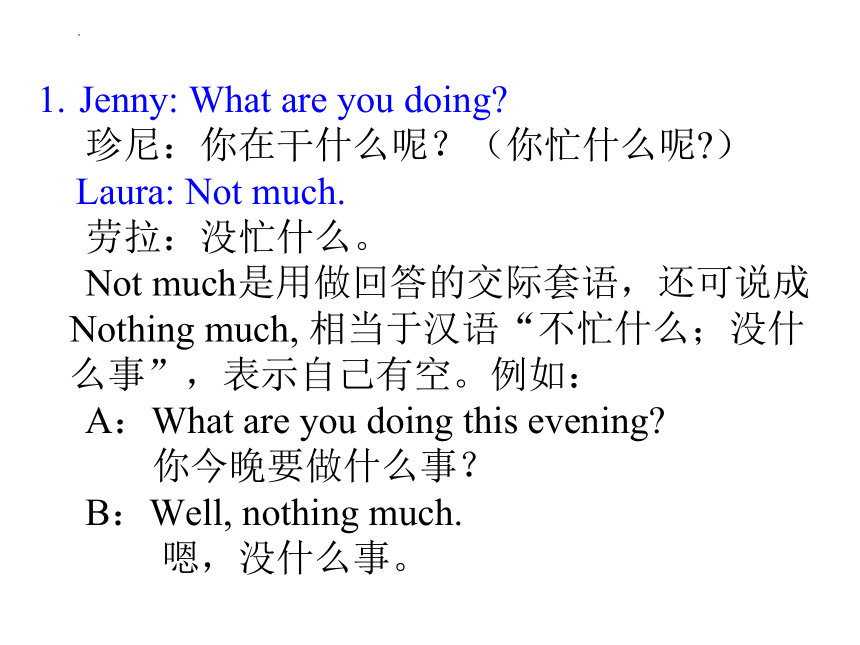
文档简介
(共22张PPT)
I'm watching TV.
Unit 6
SectionA
(2a-2d)
Learning aims
1、通过看图说话、师生问答、听录音、角色扮演等形式,掌握movie, just, house, drink, tea, tomorrow等新单词,并能用英语询问正在进行的动作。
2、通过师生问答、角色扮演等形式,学会“What is...doing ” “-Is he/she...doing –Yes, he is./No, he isn’t.”等句子结构,并能用英语谈论、描述自己或同伴正在做的事情,从而掌握现在进行时的特殊疑问句、一般疑问句及简略回答。
movie
go to the movies
just
eat out
house
drink
tea
drink tea
tomorrow
n. 电影
看电影
adv. 只是;恰好
出去吃饭
n. 房子
v. 喝;n. 饮料
n. 茶;茶叶
喝茶
adv. 在明天n. 明天;未来
Words and expressions
1.What is Steve doing
2.What is Jack doing
a. He is watching TV.
b. He is listening to a CD.
2a Listen and match the answers with the questions.
Listening
Jack: Hello, Steve.
Steve: Hi, Jack.
Jack: What _____ you ______, Steve
Steve: I’m ___________. What about you
Jack: I’m _______________, but it’s kind of
_______.
Steve: Yeah, my TV show is also not very
__________. Do you want to _____ the
movies
Jack: That sounds good.
are doing
watching TV
listening to a CD
2b Listen again. Fill in the blanks.
boring
interesting
go to
2d Role-play the conversation.
Jenny:Hello This is Jenny.
Laura:Hi, Jenny.It’s Laura here.
Jenny:Oh, hi, Laura.What are you doing
Laura:Not much. I’m just washing my clothes.What about you
Jenny:I’m watching TV.Do you want to join me for dinner My parents aren’t at home. We can eat out.
Laura:Yeah. I’d love to.
Jenny:Let’s meet at my home first.
Come at half past six.
Laura:Ok. See you then.
打电话介绍自己
This/It is...
= I’d like to.
join sb.for sth.和某人一起做某事
Jenny: Hello ______________(我是珍妮).
Laura: Hi, Jenny. It’s Laura here.
Jenny: Oh, hi, Laura. What are you doing?
Laura : ___________(没忙什么).
_________________________(我只是在洗我的衣服).
What about you?
Jenny :I am watching TV.__________________________
(你想和我共进晚餐吗) My parents aren’t at home.
We can eat out.
Laura :Yeah. __________(我很乐意).
Jenny: Let’s meet at my home first.
Come at ____________(六点半)
Laura: Ok. See you then.
This is Jenny
Not much
I’m just washing my clothes
Do you want to join me for dinner
half past six
I’d love to
Practice the conversation in 2b with your partner. Then make conversations about what you are doing.
Jenny: What are you doing
珍尼:你在干什么呢?(你忙什么呢 )
Laura: Not much.
劳拉:没忙什么。
Not much是用做回答的交际套语,还可说成 Nothing much, 相当于汉语“不忙什么;没什么事”,表示自己有空。例如:
A:What are you doing this evening
你今晚要做什么事?
B:Well, nothing much.
嗯,没什么事。
2. Do you want to join me for dinner
你想跟我一起吃个饭吗?
join somebody for something 表示“与某人一起做某事;参与或加入到某人的行列中一起做某事”。例如:
Would you come and join us for a cup of coffee We need to talk to you.
你来跟我们喝杯咖啡好吗? 我们要跟你谈一谈。
join / join in 的区别
例如:
He joined the League in 1985.
他在1985年入团。
I hope you’ll all join in the discussion.
我希望你们大家都参加讨论。
join 指加入某党派、某组织或某社会团体,以及参军等,还可表示参与某种活动。
例句:
I will never forget the day when I joined the Party.
我永远也忘不了入党的那一天。
join in 通常指参加某种活动,尤其指和其他人一起参加某项活动。例句:
May I join in the game
我可以参加这个比赛吗?
用 join 和 join in 的适当形式填空。
1. We are playing football. Do you want to __________
2. You are welcome to _________ us.
3. He is against letting girls ________ the club.
join in
join
join
3. I’d love to.
我很乐意。
1) 作为一个交际应答套语,I’d love to 经常用于礼貌地接受他人邀请,还可说成I’d like to, 但语气较前者稍弱。例如:
A:Would you like to come with us to the show
你愿意跟我们一起去看表演吗?
B:Thanks. I’d like to.
多谢了,我可以的。
2) 当婉言拒绝他人邀请时,英语多用I’d love to, but … 或Sorry, I’m afraid I can’t because …等。例如:
A:I’m going to town. Would you like to join me
我进城去,你想跟我一同去吗?
B:Sorry, I’m afraid I can’t because I still have lots of homework to do.
真抱歉,恐怕我去不成,我还有好多作业要做。
Look!
They are drinking tea now.
He reads books every moring.
Are they drinking now
Yes, they are./No, they aren’t.
Does he read books every morning
Yes ,he does. / No,he doesn’t.
He doesn’t read books every moring.
They are not drinking tea now.
一般疑问句
否定句
否定句
一般疑问句
肯定/否定回答
肯定/否定回答
现在进行时的构成:主语 + be + v-ing...
一般现在时的构成:主语 + 动词.
时间状语常为usually, often, sometimes, on Monday, every day等等。
常见标志词为:
now, look, listen, It’s +时刻点.
这两种时态的区别是:
1.时间状语
2.动词的形式
get ________ 2. brush ________
3. run ________ 4. make _______
eat ______ 6. speak _________
wash ________ 8. do ______
9. study ________ 10. listen _________
getting
brushing
making
eating
speaking
studying
washing
running
listening
doing
A: What’re you doing
B: I ____________ (get) up.
am getting
She’s using the computer.
What’s she doing
She’s using the computer.
(变一般疑问句)
__ ____ ______ the computer
Is she using
特殊疑问句
肯定句
Yes, she is.
She is not using the computer.
否定句
No, she isn’t.
肯定/否定回答
Summary:
1.重点单词和短语:movie,just,go to the movies,eat out;bike;
3.句型(1)—What +be动词+主语+V-ing?
—主语 +be动词+V-ing
(2)—Do you want to … ?
—Yes,I'd love to.
(3)打电话用语:—It’s+人名.
—This is +人名.
堂清练习
一.用所给单词的适当形式填空。
1. My mother __________ (make) soup now.
2. Mary always _______ (drink) tea after dinner.
3. It’s six o’clock now.What ____ Mary and Bob
______ (do)
4. Do you want ______ (see) the animals
5. Look!Dave _________(write)a letter to his friend.
is making
drinks
are
doing
to see
is writing
二.按要求完成句子。
1. His grandpa is drinking tea now. (变一般疑问句)
___ ____ grandpa _________ tea now
2. The boy is talking on the phone.
(对划线部分提问)
_____ ____ the boy _______
3. Linda usually brushes teeth in the evening.
(用now改写句子)
Linda ___ _________ _____ _____.
Is his drinking
What is doing
is brushing teeth now
I'm watching TV.
Unit 6
SectionA
(2a-2d)
Learning aims
1、通过看图说话、师生问答、听录音、角色扮演等形式,掌握movie, just, house, drink, tea, tomorrow等新单词,并能用英语询问正在进行的动作。
2、通过师生问答、角色扮演等形式,学会“What is...doing ” “-Is he/she...doing –Yes, he is./No, he isn’t.”等句子结构,并能用英语谈论、描述自己或同伴正在做的事情,从而掌握现在进行时的特殊疑问句、一般疑问句及简略回答。
movie
go to the movies
just
eat out
house
drink
tea
drink tea
tomorrow
n. 电影
看电影
adv. 只是;恰好
出去吃饭
n. 房子
v. 喝;n. 饮料
n. 茶;茶叶
喝茶
adv. 在明天n. 明天;未来
Words and expressions
1.What is Steve doing
2.What is Jack doing
a. He is watching TV.
b. He is listening to a CD.
2a Listen and match the answers with the questions.
Listening
Jack: Hello, Steve.
Steve: Hi, Jack.
Jack: What _____ you ______, Steve
Steve: I’m ___________. What about you
Jack: I’m _______________, but it’s kind of
_______.
Steve: Yeah, my TV show is also not very
__________. Do you want to _____ the
movies
Jack: That sounds good.
are doing
watching TV
listening to a CD
2b Listen again. Fill in the blanks.
boring
interesting
go to
2d Role-play the conversation.
Jenny:Hello This is Jenny.
Laura:Hi, Jenny.It’s Laura here.
Jenny:Oh, hi, Laura.What are you doing
Laura:Not much. I’m just washing my clothes.What about you
Jenny:I’m watching TV.Do you want to join me for dinner My parents aren’t at home. We can eat out.
Laura:Yeah. I’d love to.
Jenny:Let’s meet at my home first.
Come at half past six.
Laura:Ok. See you then.
打电话介绍自己
This/It is...
= I’d like to.
join sb.for sth.和某人一起做某事
Jenny: Hello ______________(我是珍妮).
Laura: Hi, Jenny. It’s Laura here.
Jenny: Oh, hi, Laura. What are you doing?
Laura : ___________(没忙什么).
_________________________(我只是在洗我的衣服).
What about you?
Jenny :I am watching TV.__________________________
(你想和我共进晚餐吗) My parents aren’t at home.
We can eat out.
Laura :Yeah. __________(我很乐意).
Jenny: Let’s meet at my home first.
Come at ____________(六点半)
Laura: Ok. See you then.
This is Jenny
Not much
I’m just washing my clothes
Do you want to join me for dinner
half past six
I’d love to
Practice the conversation in 2b with your partner. Then make conversations about what you are doing.
Jenny: What are you doing
珍尼:你在干什么呢?(你忙什么呢 )
Laura: Not much.
劳拉:没忙什么。
Not much是用做回答的交际套语,还可说成 Nothing much, 相当于汉语“不忙什么;没什么事”,表示自己有空。例如:
A:What are you doing this evening
你今晚要做什么事?
B:Well, nothing much.
嗯,没什么事。
2. Do you want to join me for dinner
你想跟我一起吃个饭吗?
join somebody for something 表示“与某人一起做某事;参与或加入到某人的行列中一起做某事”。例如:
Would you come and join us for a cup of coffee We need to talk to you.
你来跟我们喝杯咖啡好吗? 我们要跟你谈一谈。
join / join in 的区别
例如:
He joined the League in 1985.
他在1985年入团。
I hope you’ll all join in the discussion.
我希望你们大家都参加讨论。
join 指加入某党派、某组织或某社会团体,以及参军等,还可表示参与某种活动。
例句:
I will never forget the day when I joined the Party.
我永远也忘不了入党的那一天。
join in 通常指参加某种活动,尤其指和其他人一起参加某项活动。例句:
May I join in the game
我可以参加这个比赛吗?
用 join 和 join in 的适当形式填空。
1. We are playing football. Do you want to __________
2. You are welcome to _________ us.
3. He is against letting girls ________ the club.
join in
join
join
3. I’d love to.
我很乐意。
1) 作为一个交际应答套语,I’d love to 经常用于礼貌地接受他人邀请,还可说成I’d like to, 但语气较前者稍弱。例如:
A:Would you like to come with us to the show
你愿意跟我们一起去看表演吗?
B:Thanks. I’d like to.
多谢了,我可以的。
2) 当婉言拒绝他人邀请时,英语多用I’d love to, but … 或Sorry, I’m afraid I can’t because …等。例如:
A:I’m going to town. Would you like to join me
我进城去,你想跟我一同去吗?
B:Sorry, I’m afraid I can’t because I still have lots of homework to do.
真抱歉,恐怕我去不成,我还有好多作业要做。
Look!
They are drinking tea now.
He reads books every moring.
Are they drinking now
Yes, they are./No, they aren’t.
Does he read books every morning
Yes ,he does. / No,he doesn’t.
He doesn’t read books every moring.
They are not drinking tea now.
一般疑问句
否定句
否定句
一般疑问句
肯定/否定回答
肯定/否定回答
现在进行时的构成:主语 + be + v-ing...
一般现在时的构成:主语 + 动词.
时间状语常为usually, often, sometimes, on Monday, every day等等。
常见标志词为:
now, look, listen, It’s +时刻点.
这两种时态的区别是:
1.时间状语
2.动词的形式
get ________ 2. brush ________
3. run ________ 4. make _______
eat ______ 6. speak _________
wash ________ 8. do ______
9. study ________ 10. listen _________
getting
brushing
making
eating
speaking
studying
washing
running
listening
doing
A: What’re you doing
B: I ____________ (get) up.
am getting
She’s using the computer.
What’s she doing
She’s using the computer.
(变一般疑问句)
__ ____ ______ the computer
Is she using
特殊疑问句
肯定句
Yes, she is.
She is not using the computer.
否定句
No, she isn’t.
肯定/否定回答
Summary:
1.重点单词和短语:movie,just,go to the movies,eat out;bike;
3.句型(1)—What +be动词+主语+V-ing?
—主语 +be动词+V-ing
(2)—Do you want to … ?
—Yes,I'd love to.
(3)打电话用语:—It’s+人名.
—This is +人名.
堂清练习
一.用所给单词的适当形式填空。
1. My mother __________ (make) soup now.
2. Mary always _______ (drink) tea after dinner.
3. It’s six o’clock now.What ____ Mary and Bob
______ (do)
4. Do you want ______ (see) the animals
5. Look!Dave _________(write)a letter to his friend.
is making
drinks
are
doing
to see
is writing
二.按要求完成句子。
1. His grandpa is drinking tea now. (变一般疑问句)
___ ____ grandpa _________ tea now
2. The boy is talking on the phone.
(对划线部分提问)
_____ ____ the boy _______
3. Linda usually brushes teeth in the evening.
(用now改写句子)
Linda ___ _________ _____ _____.
Is his drinking
What is doing
is brushing teeth now
同课章节目录
- Unit 1 Can you play the guitar?
- Section A
- Section B
- Unit 2 What time do you go to school?
- Section A
- Section B
- Unit 3 How do you get to school?
- Section A
- Section B
- Unit 4 Don't eat in class.
- Section A
- Section B
- Unit 5 Why do you like pandas?
- Section A
- Section B
- Unit 6 I'm watching TV.
- Section A
- Section B
- Review of Units 1-6
- Unit 7 It's raining!
- Section A
- Section B
- Unit 8 Is there a post office near here?
- Section A
- Section B
- Unit 9 What does he look like?
- Section A
- Section B
- Unit 10 I'd like some noodles.
- Section A
- Section B
- Unit 11 How was your school trip?
- Section A
- Section B
- Unit 12 What did you do last weekend?
- Section A
- Section B
